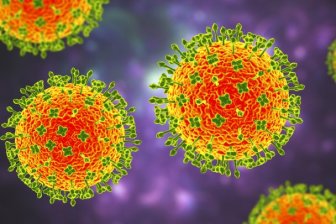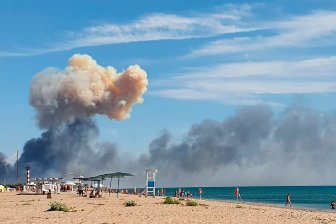Fisheries and Oceans Canada (DFO) has sent a regulatory inspection team to a Trans Mountain pipeline expansion construction site in Hope, B.C., where dead salmon have washed ashore.
Trans Mountain crews began permitted work in the Coquihalla River at the start of the month, where spawning salmon have begun their run a few weeks earlier than usual.
Since then, Hope resident Kate Tairyan has shared several photos and videos of dead salmon near the construction site. She has even cut some of them open and found them to be full of eggs.
“I was very, very worried,” she told Global News, “very concerned that this river is supporting the salmon run and this machinery doesn’t have to be in the river right now. They shouldn’t be in the river.”
Read more:
Woodpecker nest halts construction of Trans Mountain expansion near Bridal Falls, B.C.
Other videos posted to social media by Protect the Planet, a grassroots coalition that opposes the pipeline, appear to show salmon struggling to swim up the river through the construction site — blocked at times, by various equipment.
In a written statement, Trans Mountain said it takes “great care” to preserve the local ecosystem.
“During the crossing of the Coquihalla River, diversion pumps are also being used to reduce flow through the excavation area and water monitoring is taking place throughout the construction process,” a spokesperson wrote on Wednesday.
“After the pipes are installed, the stream will be returned to the natural flow path and the site will be reclaimed to its original condition with additional bed and bank flood protection.”
Trans Mountain further said all its work is undertaken in compliance with its permits, and “fish salvage work is undertaken under fish collection permits” issued by DFO and the B.C. Ministry of Forests.
Fisheries and Oceans Canada is “aware of criticism” related to the impact of construction on spawning salmon. In a Wednesday email, it said its conservation and protection officers attended the site on Aug. 8, and regulatory staff visited on Aug. 9 with a Trans Mountain’s Indigenous monitors.
“DFO staff observed sediment was being managed and monitored appropriately, juvenile fish were being removed from a side channel located downstream and outside of the construction area,” wrote communications advisor Janine Malikian.
“There were no barriers to fish passage with equipment in the water. All works were in compliance with conditions of the applicable Fisheries Act authorization.”
Read more:
B.C. adds conditions for Trans Mountain pipeline expansion, ministers say concerns remain
Trans Mountain also confirmed that between July 30 and Aug. 2, “a small number of early-run sockeye were observed in the system.” It said its contracted, provincially-regulated fisheries biologists determined all of them were either “spent or burnt-out adults.”
It would be “inappropriate,” a spokesperson added, to comment on the video circulating of a dead salmon with unlaid eggs in its belly, when asked about how that evidence aligned with Trans Mountain’s claims that the impacted salmon were “spent.”
“The only videos we have viewed are those that have been shared with media outlets and therefore we are unable to validate the location or date of these videos,” wrote the spokesperson.

If completed, the Trans Mountain expansion will triple the capacity of an existing pipeline that transports 300,000 barrels of oil per day from Alberta to terminals and refineries on the west coast.
Its opponents say it would do irrevocable harm to the environment, push Canada’s emissions targets out of reach, and violate the sovereignty of First Nations who have taken a stance against it.
Its supporters, however, tout the much-needed jobs it will provide B.C. and Alberta, in addition to billions of dollars in benefits to governments and communities. Trans Mountain has also insisted the pipeline expansion can and will be operated safely with minimal environmental impacts.
Read more:
Trans Mountain pipeline to result in net loss for Ottawa: PBO
The company’s work permit, renewed on July 28, allows it to excavate an open wet-cut trench across the Coquihalla River and backfill it after the removal and replacement of an existing section of the pipeline. Trans Mountain is also installing the expansion pipeline under the river to connect the Hope Station to the north riverbank.
The work may be conducted between Aug. 1 and 31, its permit reads.
The DFO-issued approval acknowledges the likelihood of “permanent alteration” to about 800 square metres of instream spawning habitat for pink salmon and steelhead trout. It also lays out dozens of environmental conditions designed to minimize the impacts, but Tairyan said she believes some of those requirements are not being followed.

Her property in Hope backs onto the Coquihalla River. Tairyan, a volunteer for Protect the Planet, said she spent an entire day by the construction site on Aug. 7, and saw no one checking the water quality downstream of the instream construction, as outlined by the permit, and no Indigenous monitor on-site.
Trans Mountain told Global News water monitoring is taking place throughout the process and an Indigenous monitor “has been at the site this week.”
“What the response from TMX is, they are ramping up their security, they are putting more fences and screens for me not to see what is happening,” Tairyan said.
“Our question is, how come there are spawning salmon in the river right now and this permit is not being revisited (by DFO) at least? That’s what we’re trying to get them to do.”
Read more:
Ottawa approves new $10B loan guarantee for Trans Mountain pipeline project
Tairyan, who is also the director of undergraduate programs at Simon Fraser University’s Health Sciences Department, said she cannot be 100 per cent certain the construction is causing the salmon kill. She has walked about a kilometre both upstream and downstream from the site, however, and told Global News most of the dead fish are within 50 to 80 metres of it.
Jarred Sparrow, a Musqueam commercial and treaty rights fisherman, said he doesn’t understand why Trans Mountain delay its construction now that it is aware the salmon are spawning early. He has been fishing in the Fraser River since he was five years old.
“I just feel they can find a different way of doing something. It might cost them a little bit more money, but it was a small section of the river,” he said in an interview.
“My concern is that yeah, they’ve been approved to do what they’re going to do, but when they dump all that silt in the water it makes it more dense and any fish that are in that water at that time are going to get suffocated 100 per cent.”
Trans Mountain’s worksite is about three kilometres from where the Coquihalla River meets the Fraser River. Its pipeline is expected to cross the Coquihalla River in multiple locations.
In a thread of tweets, B.C. Environment Minister George Heyman said the provincial government is investigating public concerns about salmon and the construction site in areas within its jurisdiction.
“The BC Conservation Officer Service attended the site yesterday and relayed information to the relevant oversight bodies, including DFO and the BC Oil and Gas Commission,” he tweeted Tuesday.
“The BC Oil and Gas Commission has also sent an inspector to the site.”
Read more:
‘Best season in my lifetime’: B.C. salmon returns strong, Indigenous fisherman says
On Wednesday, BC Green Party MLA Adam Olsen urged Trans Mountain to halt its work until the salmon migration is complete, claiming its permit to trench the river was based on a “least-risk scenario.”
“Salmon represent a key part of the ecosystem and it is unacceptable that they be placed in danger over the priorities of a fossil fuel company,” he said in a news release. “With salmon stocks already on the decline in B.C., we simply cannot risk further damage to the population.”
The B.C. government, under Premier John Horgan, has publicly said its opposition to the project and its disappointment with federal approval for it.
© 2022 Global News, a division of Corus Entertainment Inc.



